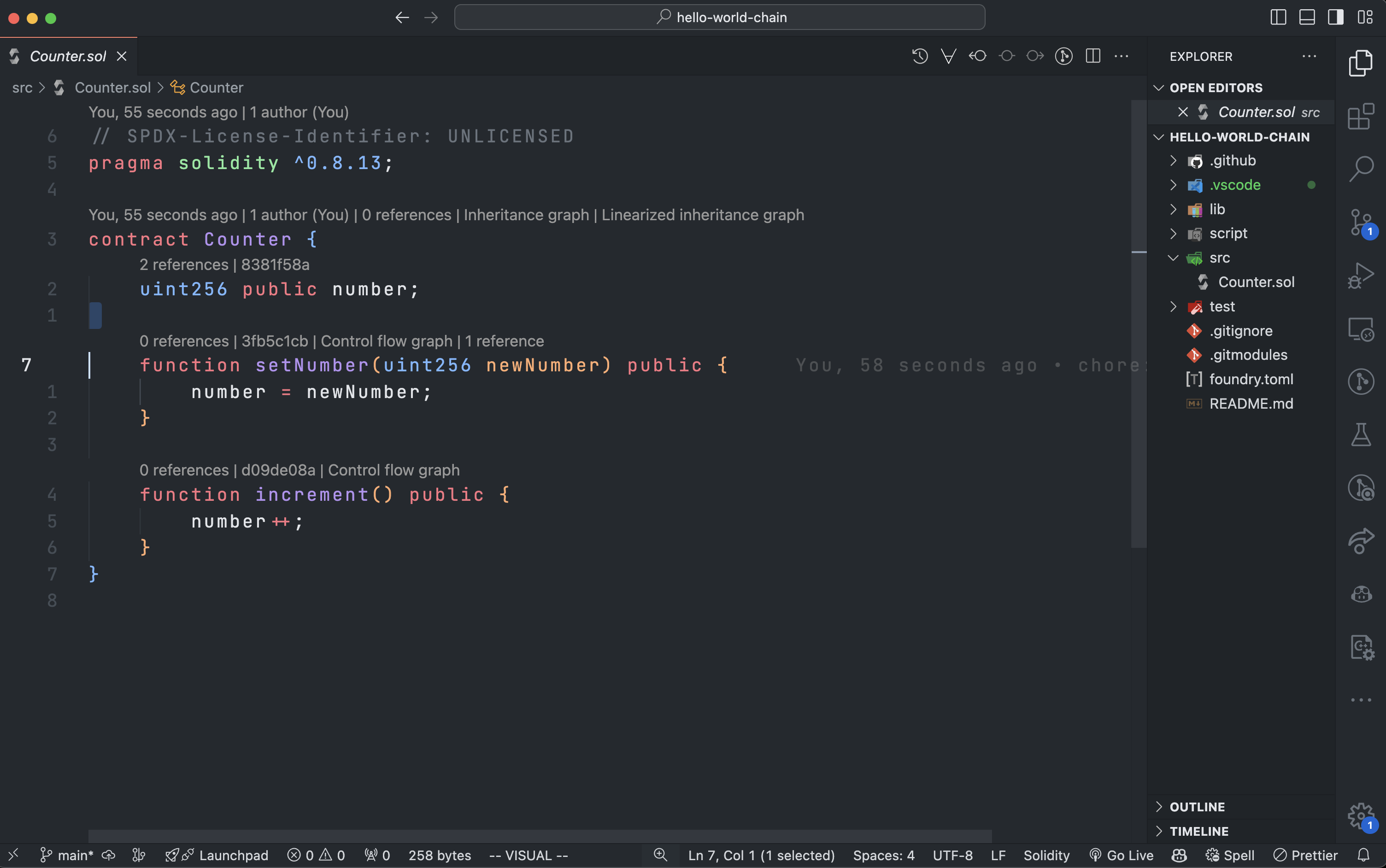Deploy a HelloWorldChain smart contract to World Chain Sepolia using Foundry: setup, build, test, fund, and create.
In this tutorial, we will use the Solidity programming language to write the HelloWorldChain smart contract for World Chain.
Solidity is a programming language that can compile to EVM (Ethereum Virtual Machine) bytecode which can be executed on the World Chain EVM.
We will also be using the Foundry CLI toolkit, which has a lot of tools to help build, test and interact with Solidity programs.
First, we need to install the Foundry CLI toolkit and the Solidity compiler. Solidity comes with a compiler called solc which we will use to compile the HelloWorldChain contract. The Foundry CLI
will automatically download the right version of the Solidity compiler for you during the compilation process using forge build.
Open your terminal of choice, navigate to a directory where you want to create your project, and run the following command to create a new Foundry project:
Copy
Ask AI
hello-world-chain ```</CodeGroup>Now that you have created a new Foundry project, you can start writing your smart contract. All smart contracts in Foundry projects are stored in the `src` directory.If you are using VSCode, it should look something like this:## Write the HelloWorldChain contractFirst, delete the template file called Counter.sol in the /src directory:<CodeGroup>```bash Delete Template rm src/Counter.sol ```</CodeGroup>Next, create a new file called HelloWorldChain.sol in the /src directory and add the following code to it:<CodeGroup>```solidity HelloWorldChain.sol// SPDX-License-Identifier: MITpragma solidity ^0.8.28;contract HelloWorldChain {string private word; // Constructor that sets the initial word to "Hello World Chain!" constructor() { word = "Hello World Chain!"; } // Setter function to update the word function setWord(string memory newWord) public { word = newWord; } // Getter function to return the current word function getWord() public view returns (string memory) { return word; }}
This contract has a word variable that stores a string and two functions: setWord to update the word and getWord to return the current word.
Since we deleted Counter.sol, we need to update or remove the scripts and tests that reference it to prevent compilation errors.Delete the script directoryThe script directory contains scripts that import Counter.sol. Since we no longer have Counter.sol, we can delete the entire script directory to avoid any compilation issues:
Copy
Ask AI
rm -rf script
ReplaceCounter.t.sol with HelloWorldChain.t.solIn the test directory, delete the existing Counter.t.sol and create a new test file called HelloWorldChain.t.sol and add the following simple tests:
Copy
Ask AI
// SPDX-License-Identifier: MITpragma solidity ^0.8.28;import "forge-std/Test.sol";import "../src/HelloWorldChain.sol";contract HelloWorldChainTest is Test {HelloWorldChain helloWorldChain; function setUp() public { helloWorldChain = new HelloWorldChain(); } function testInitialWord() public view { string memory expected = "Hello World Chain!"; string memory actual = helloWorldChain.getWord(); assertEq(actual, expected); } function testSetWord() public { string memory newWord = "Hello Foundry!"; helloWorldChain.setWord(newWord); string memory actual = helloWorldChain.getWord(); assertEq(actual, newWord); }}
To deploy the HelloWorldChain contract to World Chain Sepolia, you will need a wallet with some World Chain Sepolia ETH. An easy way to generate a
wallet using the Foundry CLI is to run the following command:
Copy
Ask AI
bash Generate a wallet cast wallet new
cast is a versatile set of utility functions and commands for Solidity development. In this case, we are using one of its many built-in features to generate a wallet with one account.
Never share your private key with anyone and always make sure that you don’t
upload them to code versioning tools like Git and hosting platforms like
GitHub. Research best practices for private key management in order to avoid
loss of funds.
The output of the command will look something like this:
Copy
Ask AI
Successfully created new keypair.Address: 0xB815A0c4bC23930119324d4359dB65e27A846A2dPrivate key: 0xcc1b30a6af68ea9a9917f1dda20c927704c5cdb2bbe0076901a8a0e40bf997c5```## Fund your walletNow that you have a wallet, you need to fund it with some World Chain Sepolia ETH. You can get some World Chain Sepolia ETH from the [World Chain Sepolia faucet](https://www.alchemy.com/faucets/world-chain-sepolia) operated by Alchemy.In the form on the faucet page, enter the address of your wallet which you generated above and click the "Send me ETH" button. If you have any issues please send us a message in the developergroup chat on [Telegram](https://t.me/worlddevelopersupport) or [Discord](https://world.org/discord).## Deploy the contractNow that you have a wallet and you funded it with World Chain Sepolia ETH, you can deploy the `HelloWorldChain` contract to World Chain Sepolia using the following `forge create` command:<CodeGroup> ```bash Deploy the contract forge create src/HelloWorldChain.sol:HelloWorldChain --rpc-url https://worldchain-sepolia.g.alchemy.com/public --private-key 0xcc1b30a6af68ea9a9917f1dda20c927704c5cdb2bbe0076901a8a0e40bf997c5 ```</CodeGroup>Here, we are using the `<path>:<contractname>` format to specify the contract. This tells Foundry where to find the contract file (src/HelloWorldChain.sol) and which contract within the file (HelloWorldChain) to deploy.We also use the `--rpc-url` flag to specify the RPC URL of the World Chain Sepolia network and the `--private-key` flag to specify the private key of the wallet we generated earlier.On top of this we can also provide other flags like `-vvvvv` to get more verbose output from the deployment process, `--verify` to verify the contract on [Worldscan](https://worldscan.org) or [Blockscout](https://worldchain-sepolia.explorer.alchemy.com/) (alongside with an `--etherscan-api-key` flag) andseveral other flags to toggle different features that you can find more about in the [Foundry documentation](https://book.getfoundry.sh/).And that's it! You have successfully deployed a smart contract to World Chain Sepolia. You can interact with the contract using `forge script` scripts, using a block explorer or any other EVM library like [ethers.js](https://docs.ethers.io/v5/), [alloy-rs](https://github.com/alloy-rs/alloy/), and many others.